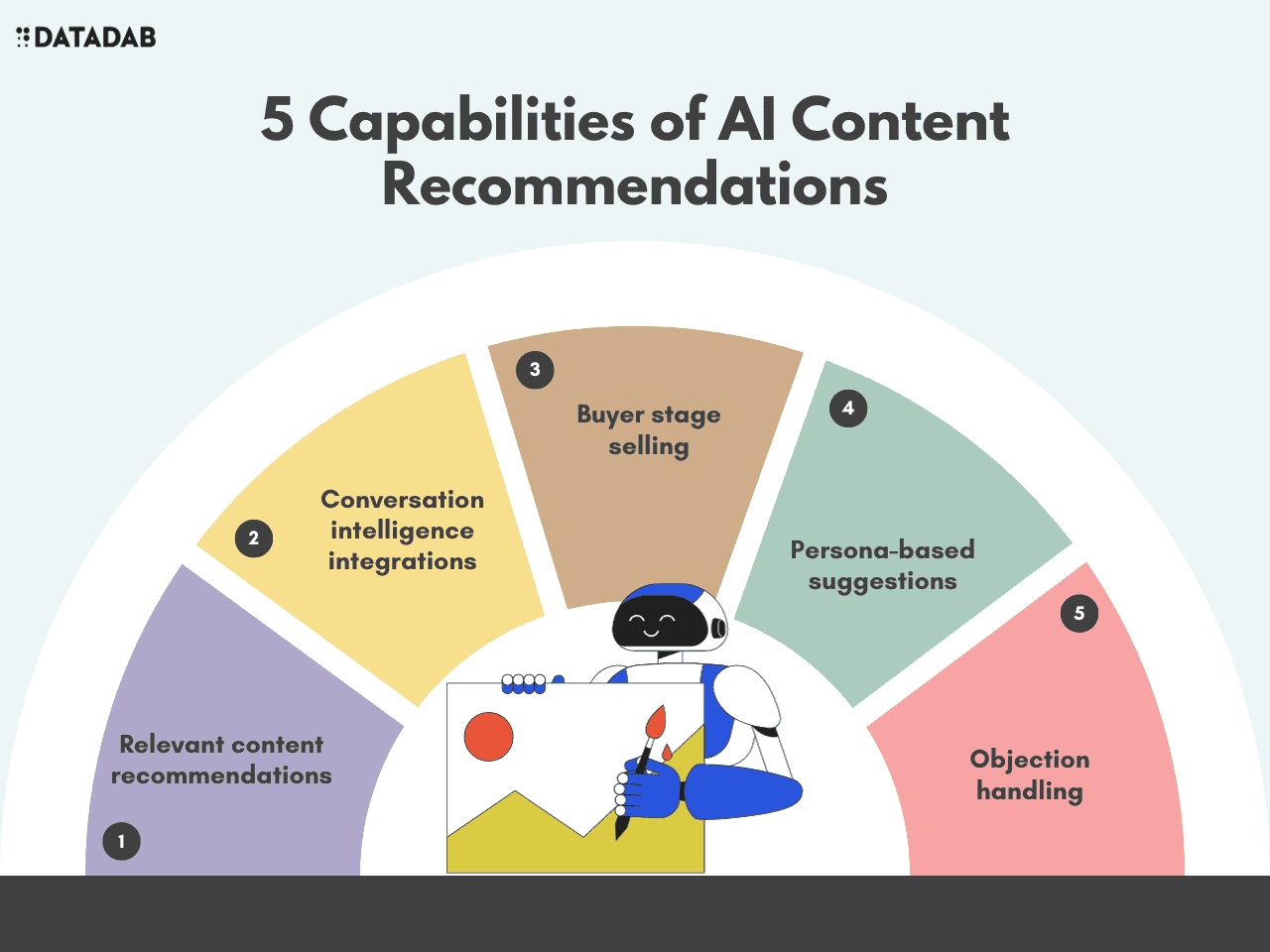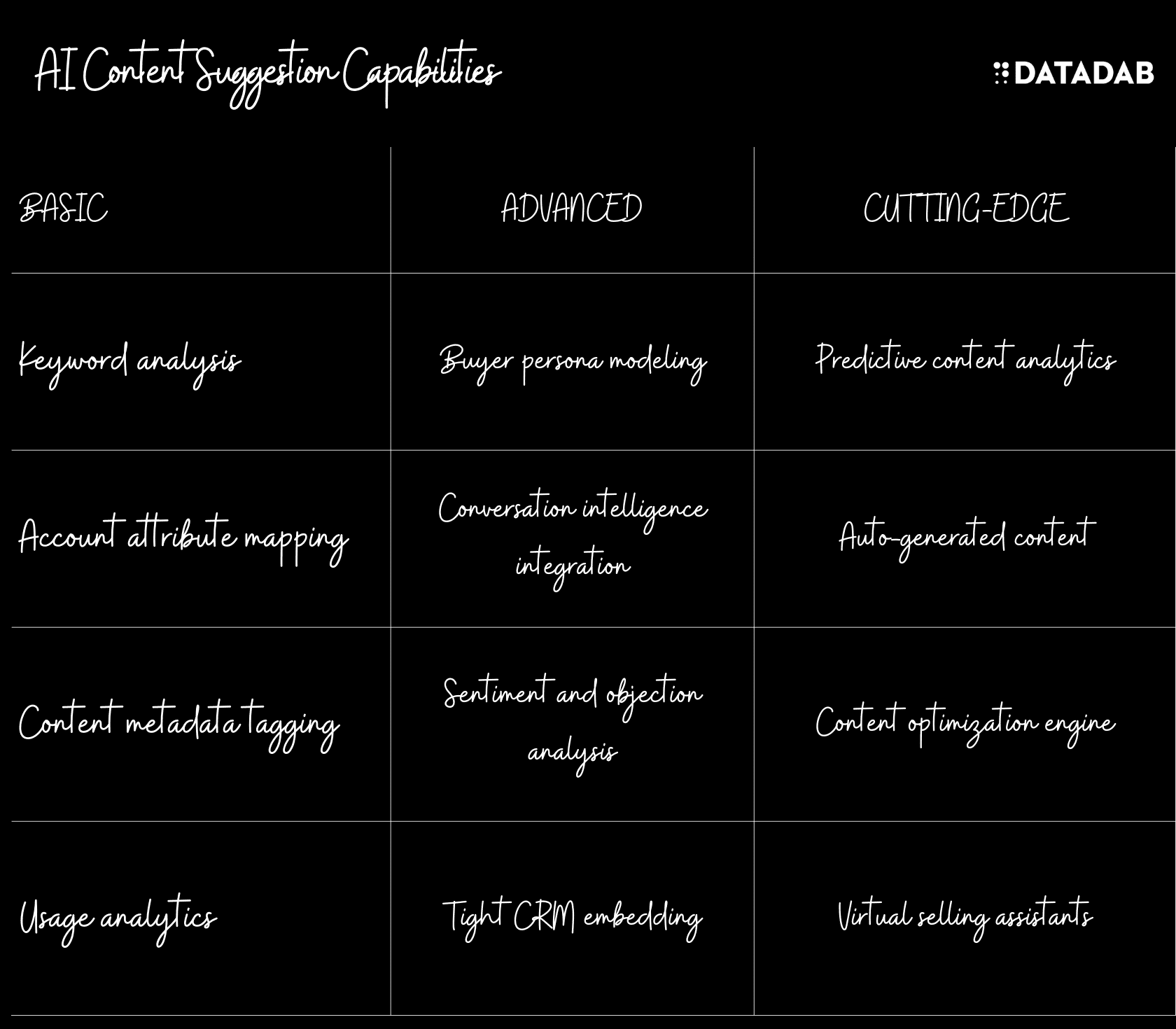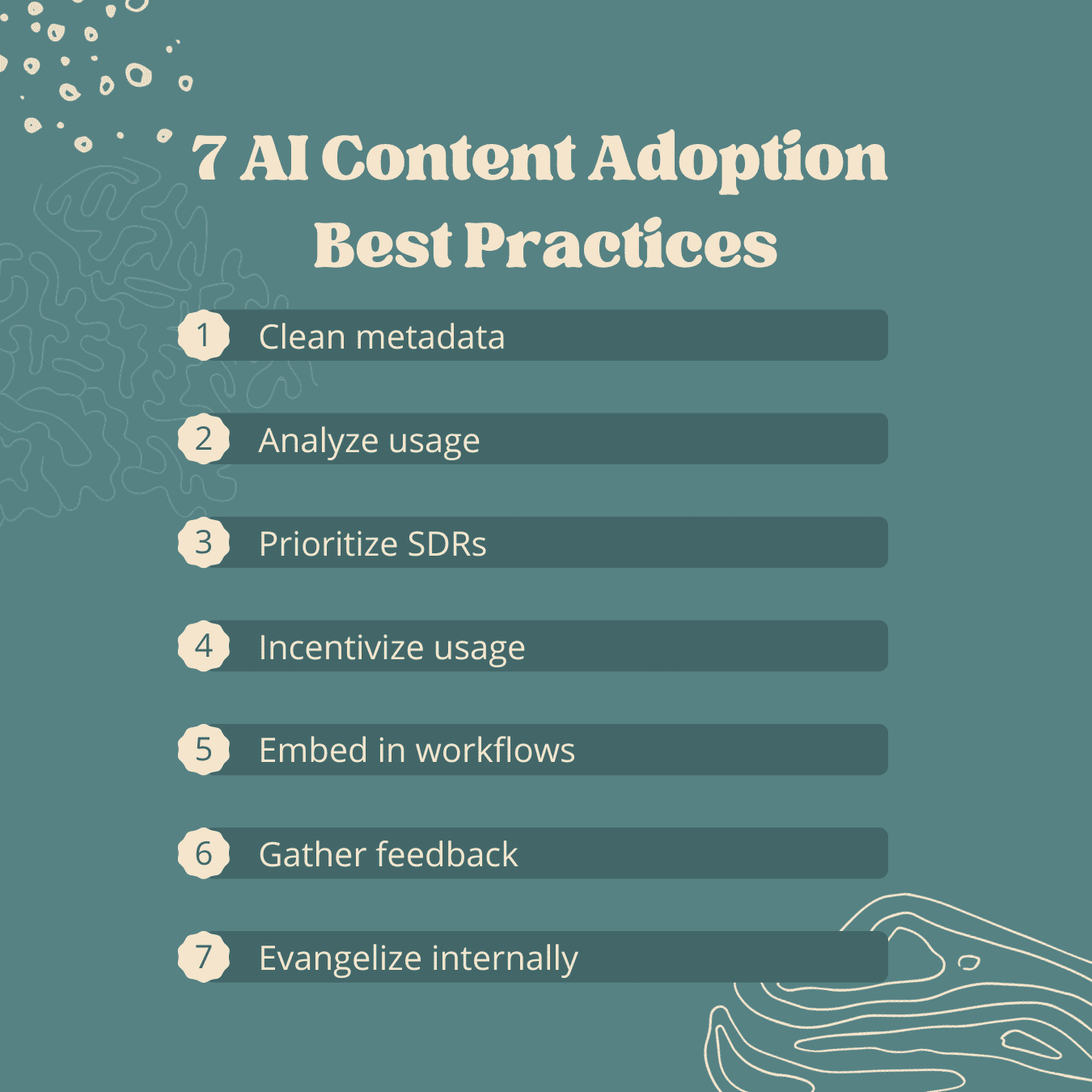"The beauty of AI content recommendations is how they get better over time. With every sales interaction and user feedback loop, the relevance keeps improving."
In the world of sales enablement, content is king. But more content doesn't always equal more revenue. The key is surfacing the right content at the right time to move deals forward. This is where AI-powered content suggestions come in.
As a marketer for a sales enablement software company, you need to convince prospects that AI-recommended content is the future. This technology eliminates friction for sales reps, improves customer experiences, and drives sales performance.
In this article, we'll explore how AI transforms content relevance, and why it's a must-have capability for modern sales enablement.

The Problem AI Solves
Even the most well-stocked content libraries have diminishing returns without smart personalization. Reps waste tons of time searching for relevant collateral. Customers feel overwhelmed by generic, spray-and-pray content.
AI-recommended content solves this by using data to automatically surface contextual suggestions tailored to accounts and stages. As a sales enablement marketer, here are the key problems AI addresses:
Frictionless Content Discovery
AI eliminates tedious searching so reps execute customer interactions faster. SalesLoft reported 20% faster content sharing when supported by machine learning recommendations.
Contextual Recommendations
The system surfaces content most likely to resonate based on the account profile, contacts, and stage. Reps get precision guidance.
Conversation Intelligence Integrations
Dynamic suggestions based on recorded calls and meetings power more relevant follow-ups at scale.

Buyer Stage Selling
Content is tailored to buying stage models like BANT or Pain-Gain-Solutions. Reps get stage-specific content mapped to the account's progress.
Objection Handling
When objections are detected, related content is suggested to help overcome barriers like pricing concerns.
Optimized Content Utilization
Analytics on content engagement help focus enablement resources on the highest impact collateral.
As a sales enablement marketer, keep these friction points and benefits top of mind when positioning AI-recommended content.

Key Capabilities to Highlight
Leading solutions like Highspot, Seismic, and Uberflip use advanced AI to deliver robust capabilities:
Relevant Content Recommendations - The system surfaces content most likely to resonate based on the account profile and stage. This saves reps time spent searching for appropriate collateral.
Conversation Intelligence Integrations - By tying content recommendations to tools like Chorus, Gong or SalesLoft, reps get dynamic suggestions based on recorded calls and meetings. This powers more relevant follow-ups.
Buyer Stage Selling - Content is tailored to buying stage models like BANT or Pain-Gain-Solutions. Reps get stage-specific content mapped to the account's progress.
Persona-Based Suggestions - Content is recommended based on the different roles and preferences of the buying committee - CIO, CTO, CMO etc. This ensures messaging resonance.
Objection Handling - When objections are detected, related content is suggested to help overcome barriers like pricing concerns.
Optimized Content Utilization - Analytics on content engagement help focus enablement resources on highest value collateral.
These capabilities perfectly position AI-recommended content as the future of sales enablement. Use them as pillars when marketing to prospects.

Quantifying the Benefits
AI content suggestions deliver impressive performance and productivity gains. As a marketer, you need to quantify the impact when promoting this technology:
- 20% faster content sharing - AI eliminates tedious searching so reps execute customer interactions faster.
- 12% higher win rates - Data-backed guidance helps reps have better quality conversations and progress opportunities.
- 10x more content relevance - Al algorithms automatically surface the best collateral vs. manual search.
- 2x more content utilization - Analytics help optimize enablement spending on highest value content.
- 20% larger content library - Reps can absorb and manage more collateral with smart recommendations.
- 57% of buyers prefer personalized content - Al powers individual recommendations at scale.
These impressive stats make a case no prospect can ignore. Use them in your messaging and campaigns.

Stand Out from Competitors
In a crowded sales enablement software market, you need differentiation. AI-powered content suggestions separate you from the pack. Communicate these unique advantages:
Deeper Buyer Insights - Rich AI models built on millions of data points understand customers better than simple attributes.
More Precise Recommendations - Advanced NLP parses meaning and sentiment for relevance beyond keywords.
Tightly Integrated Workflow - Suggestions embedded seamlessly within CRM promote everyday usage.
Constantly Optimizing - Active machine learning means the engine continuously improves recommendations.
Transparent Governance - Explainable AI provides visibility into why content is recommended.
These capabilities make your solution stand out. But don't get too technical. Focus on the business impact for customers.

Best Practices for Adoption
To drive adoption of AI content recommendations, advise customers on best practices:
Clean Content Metadata - Enrich collateral with buyer attributes, personas and stages to improve relevance.
Analyze Usage Data - Identify high-performing content to guide enablement priorities.
Incentivize Usage - Gamify adoption by celebrating top users and power contributors.
Embed in Workflows - Surface suggestions within CRM and sales engagement tools reps already use.
Gather Feedback - Continuously gather rep input to identify relevance gaps and improvement areas.
Start with SDRs - Prove value with sales development before expanding to account executives.
Evangelize Internally - Promote adoption best practices through training, events and internal social.
These recommendations position customers for an optimal rollout that drives adoption.
The Future with AI
Looking ahead, AI will expand content suggestion capabilities even further:
Lookalike Modeling - Recommend content that worked well for similar accounts.
Predictive Content Analytics - Forecast the impact of collateral on deal progression.
Content Creation Automation - Dynamically generate content tailored to accounts.
Content Optimization Engine - Continuously A/B test content performance.
Virtual Selling Assistants - AI recommends content within conversation with chatbots.
The future is bright when AI is applied to solve sales enablement challenges. This creates exciting possibilities for your company.
The Time is Now
AI-powered content suggestions represent the next frontier of sales enablement. As a marketer, it's your job to convince prospects this technology is the future. AI eliminates friction, powers relevance, and unlocks a new level of sales effectiveness.
The time is now to educate customers on AI content recommendations. This transforms sales enablement from a reactive content support function to a true driver of productivity and results. Help usher your customers into this new era of intelligent content relevance.
FAQ
1. How does AI recommend relevant content?
AI content recommendation engines ingest both content and account data to make intelligent matches.
On the content side, metadata like product, use case, buyer persona, and stage is extracted. Account data including industry, region, contacts, and deal stage is analyzed. Proprietary algorithms score content relevancy based on this multidimensional data.
Advanced NLP also evaluates content semantics, topics, and keywords to determine relevance to accounts. Models are continuously optimized as the system ingests more data.
2. How accurate are AI content suggestions?
The accuracy of recommendations improves over time as the models ingest more data. Typical accuracy ranges:
- Basic attributes - 50-60% accuracy
- Personas & stage - 60-75% accuracy
- NLP & usage analytics - 75-90% accuracy
Precision is increased by unifying content analytics, conversation intelligence, and qualitative user feedback in a continuous optimization loop.
3. How is personalized content generated for each account?
Account-specific personalization is powered by several capabilities:
- Metadata matching based on attributes like industry, region, and company size
- Contact-level matching factoring in individual roles and preferences
- Conversation intelligence integrating real account interactions
- Lookalike modeling to borrow relevance from similar accounts
- Predictive modeling of content performance for the account
This multilayered approach allows personalized content at both account and contact levels.
4. How can you ensure adoption by sales reps?
Driving user adoption requires:
- Tight embedding within existing sales workflows and tools
- Incentives through gamification, contests, and SPIFFs
- Ongoing training and best practice sharing
- Gathering user feedback to improve relevance
- Celebrating wins and ROI achieved using AI recommendations
- Starting with SDRs to prove value before expanding to AEs
Ongoing change management and internal evangelization is key.
5. How can content recommendations be explained to users?
Explainable AI provides transparency into why specific content is recommended:
- Summary of key account attributes and metadata matched
- Insight into which attributes had highest relevance score
- Ability to validate recommendation accuracy and tune model
- Visibility into rules and algorithms powering suggestions
With explainability, users can trust the system and provide improvement feedback.
6. Should content recommendations replace search?
AI and search should co-exist. Reps may want to look for specific content that complements recommendations. AI provides a baseline of relevant collateral to start customer conversations. Search adds flexibility for special scenarios.
7. How can you expand impact beyond frontline reps?
AI content recommendations can be valuable for:
- Content creators to identify gaps and optimization opportunities
- Sales leaders to double down on content driving results
- Marketers to build targeted campaigns and nurture tracks
- Customer success to provide ongoing value to accounts
The data insights on content relevance are valuable across revenue teams.
8. How can AI content improve over time?
Continuous learning feedback loops help AI content models improve:
- Ingesting more account, contact and content data expands data foundation
- Converting qualitative user feedback into model adjustments
- Testing content recommendation variants with A/B experiments
- Analyzing usage metrics and engagement data to prioritize highest-performing content
- Incorporating conversational signals from recorded sales interactions
With more data, the AI recommendations compound in accuracy.
9. What risks and limitations should be considered?
Key risks to evaluate:
- Potential to incorrectly recommend irrelevant content that damages credibility
- Overreliance on technology in place of human engagement
- Privacy considerations regarding data used for content targeting
- Change management challenges driving adoption with sales reps
- Budget and resources required for implementation and maintenance
Proactive mitigation of these factors is recommended.
10. What is the future vision for AI content recommendations?
Ongoing innovation will unlock capabilities like:
- Auto-generated content tailored to each account
- Content recommendation explanations based on conversational AI
- Reinforcement learning models that optimize content performance
- Omnichannel recommendations across web, email, ads, chatbots
- Predictive analytics forecasting content ROI
The technology will continue to enhance personalization, contextualization and performance.






